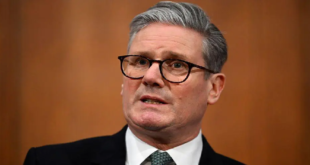03-05-2021
Bureau Report + Agencies
TEHRAN/ ISLAMABAD: Supreme Leader Ayatollah Ali Khamenei has publicly rebuked Iran’s top diplomat for his comments on internal power struggles in a controversial audiotape leaked last week.
Khamenei said during a televised speech on Sunday that he was “surprised and sorry” to hear Mohammad Javad Zarif’s comments on late Major General Qassem Soleimani’s power and influence, without directly naming the diplomat.
“Some of these comments are the repetition of the hostile talks of our enemies, the repetition of the words of America,” he said, pointing out that media opposed to Iran released the tape.
More than three hours of what was supposed to be a seven-hour confidential government oral history project was aired by Saudi Arabia-funded channel Iran International based in London.
 In the tape, Zarif said he repeatedly had to “sacrifice” diplomacy for what he refers to as “the field” denoting operations and politics driven by the Islamic Revolutionary Guard Corps (IRGC), and specifically its outward-looking Quds Force led by Soleimani until his assassination by the United States last year.
In the tape, Zarif said he repeatedly had to “sacrifice” diplomacy for what he refers to as “the field” denoting operations and politics driven by the Islamic Revolutionary Guard Corps (IRGC), and specifically its outward-looking Quds Force led by Soleimani until his assassination by the United States last year.
Zarif also says Soleimani travelled to Russia to sabotage Iran’s 2015 nuclear deal with world powers shortly after it was signed and complains that he was left in the dark on many issues, including Iran’s operations in Syria and Iraq.
Khamenei on Sunday referred to the constant opposition of the US to Iran’s growing influence in the region, saying that was why former President Donald Trump ordered Soleimani’s assassination via a drone strike in January 2020 in Baghdad.
“We shouldn’t say things that would convey the meaning that we are repeating what they are saying, whether on the Quds Force or on martyr Soleimani,” the supreme leader said.
He also asserted that like everywhere else in the world, the foreign policy of Iran is not crafted by the foreign ministry, and is merely enforced by it.
That duty in Iran, he said, falls on the Supreme National Security Council that is comprised of top-level officials from different factions of governance.
The end for Zarif?
Khamenei’s remarks will certainly further embolden hardliners who have been unstoppable in bashing the foreign minister and the government and calling for his resignation.
While it appears unlikely Zarif will resign, especially since his term ends in several months and talks to restore the nuclear deal are ongoing in Vienna, the supreme leader’s rebuke of him casts a shadow over his future in Iranian politics.
The foreign minister, a relatively popular figure among the weakened centrist and reformist factions, has repeatedly said he has no ambitions to become a candidate in the upcoming June presidential election.
 The career diplomat had previously said he might be interested in continuing to serve at the foreign ministry, or else will likely retreat to a university teaching role.
The career diplomat had previously said he might be interested in continuing to serve at the foreign ministry, or else will likely retreat to a university teaching role.
Earlier on Sunday, Zarif apologised to Soleimani’s family for the hurt he may have caused them, and said his “honest” words meant for future officials do not take away anything from Soleimani’s efforts to keep Iran and the region safe.
In an online post days earlier, he had said his comments were not meant as personal criticism of Soleimani, whom he credited for striving to establish peace in Afghanistan and Iraq and fighting the ISIL (ISIS) armed group.
Zarif published another online post following Khamenei’s speech, saying the supreme leader’s remarks are an end point to all discussions and he is sorry that his comments meant as “honest transfer of experiences” were leaked and disturbed Khamenei’s peace of mind.
President Rouhani had said earlier this week the audiotape’s leak was an attempt at sowing division by the country’s enemies to sabotage multilateral efforts in Austria’s capital to lift sanctions on Iran and curb the country’s nuclear program.
Rouhani ordered his intelligence ministry to find out who leaked the tape, and similar efforts are under way in the judiciary and the parliament.
The president also fired Hesamodin Ashna, his adviser and head of the presidential offices’ Center for Strategic Studies, since he was in charge of organizing the interview conducted with Zarif.
 Pressmediaofindia
Pressmediaofindia




